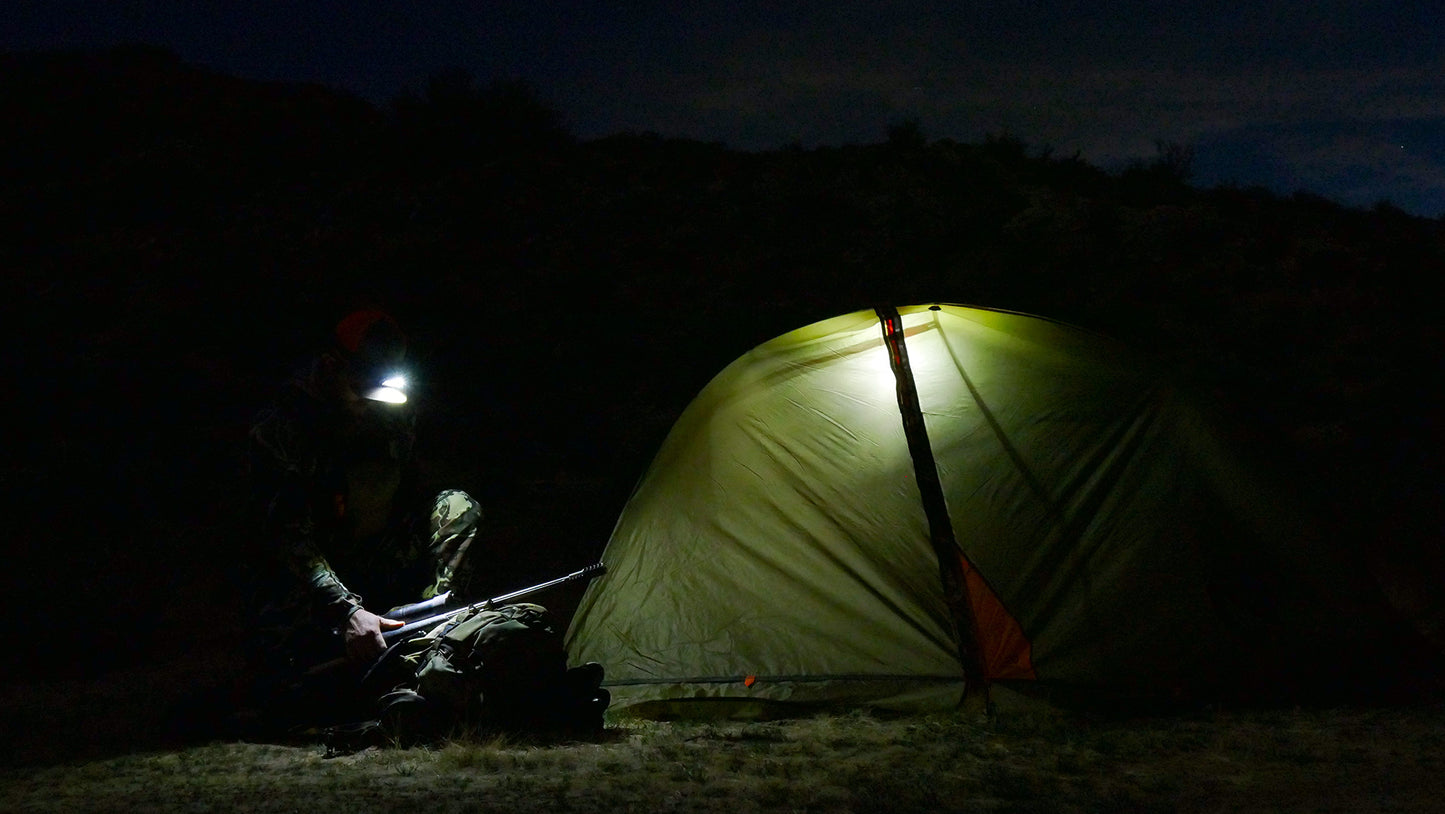
There is something enthralling about the idea of setting out into the wilderness to match wits with the elements and wild creatures all by yourself. Just you, your fortitude, and the gear you're willing to carrying in your pack. It almost feels like a trip back in time to connect with your true nature.
But then come the what-ifs. Odds are you have at least a handful of people in your life that care about you, and no matter how experienced you are in the backcountry, the thought of you heading off alone into the great unknown fills them with anxiety (especially if they saw The Revenant). Even after addressing their concerns, there are logistical issues you have to face for yourself.
Can you pack the animal out by yourself? Can you close the distance without a spotter to help guide you in, or a caller behind you drawing that bull right through your shooting lane? What if something goes wrong and you have to find a way to get yourself out?
There are a lot of variables and added layers of difficulty that come with solo hunting, so the questions you may consider include — Is solo hunting actually a good idea? Is it worth it? And is it right for you?
Without oversimplifying, I believe a strong case can be made that solo hunting IS, in fact, a good idea. But, that statement comes with a few major IFs attached to it.
SOLO HUNTING IS A GOOD IDEA IF...

...YOU KNOW HOW TO HANDLE YOURSELF IN THE WILDERNESS
I’m not saying you have to be a Kit Carson-level woodsman to head out solo, but you should have more than a few rugged experiences under your belt before you just head down a trail and hope for the best. Can you navigate if your app or GPS goes down? Do you know what to do if a thunderstorm rolls in? Can you start a fire in virtually any condition? Do you have some basic first aid knowledge (not just the supplies in your first aid kit)? And if a “yes” to any of these questions only means, “I’ve watched a YouTube video about it” — then you probably shouldn’t head out solo just yet.
Yes, a lot can (and should) be learned from the endless well of information that is the internet (or, you know, old-timey things like books), but having some basic experiences utilizing the information you’ve gathered is crucial before it’s all up to you. So, if you’re interested in solo hunting but are still pretty new to the outdoors in general, maybe put the solo hunt on the calendar for a year or two from now and spend as much time as possible in the backcountry with a couple of buddies between now and then.
Also, consider researching backcountry/survival skills and practicing them on simple day trips or even in the backyard. Develop your solo skills and confidence, but without the risk of an extended backcountry adventure. The more time you spend outside, using your gear, running into unexpected situations, and figuring out how to adapt, the more prepared you’ll be for when you’re miles from anywhere all by yourself and something crazy happens.

...YOU TRULY ENJOY SOLITUDE
Listen, long stretches of isolation aren’t for everyone. The idea of a weeklong trip in the backcountry all by yourself may seem awesome in your imagination, but for a true people-person the solitude may be torture. How many evenings by a fire with a dehydrated dinner can you spend talking to yourself before things start to get weird? Know your social limitations and plan accordingly. Maybe you cap your solo adventures to three days, or at least plan your first solo trip for a short duration, just to see how it goes. It would be awful to burn a week of vacation time and a bunch of gas only to be packing out halfway through the trip because you find you can't handle the remoteness and aloneness.
All that being said, there are those true introverts out there (myself included) who get recharged by solitude. It's not that I am some sort of anti-social curmudgeon — there are people I hunt with and enjoy every minute of our adventures together — but I also need at least a couple solo trips every year. There is something special about days of perpetual quiet, beautiful scenery, solo-pursuit of animals, and time with only my thoughts that seem to recharge my whole system. Know which camp you fall in and plan accordingly.
...YOU ADAPT YOUR HUNT
Hunting solo is not the same game as hunting with people. Every decision (and the resulting consequences) falls 100% on your shoulders. That means that your risk-aversion level needs to go up at least a couple of notches when you head out on your own. If you’re hunting with a buddy and you take a dicey path down a steep grade and something happens...yeah, it’ll be a bad day, but you’ve got someone right there to help you figure it out and get out of there. Just because you’re in shape and you could probably make it up that boulder field doesn’t necessarily mean you should when you’re solo.
A switch needs to flip in your mind on any solo hunt where you continually evaluate your next move through the lens of “I’m out here all alone.” I’m not saying you don’t hunt hard or take some risks, but I am saying that there should be moments where you look at an option and decide to pass on it simply because you’re keenly aware that you’re out there alone.

If you are a solo hunter with people waiting and worrying back at home, do yourself (and your marriage) a favor and go out of your way to over-communicate with them. I truly consider a Garmin InReach or similar satellite communication device to be an absolute necessity when you’re out solo. There’s NO good reason not to have one when you are in the backcountry by yourself. But, just simply having it doesn’t put everyone’s mind at ease when they haven’t heard from you in days. Check-in at least once a day, update them when you’re moving camp, and remain positive in your communications — it will help ease their mind, and yours. If you're anything like me, the first thing in the morning you want to do is throw on your pack and maximize every second of shooting light, but adapt to the fact that there are concerned people back home that would be reassured by a simple message that takes just a few minutes to send.
IT’S NOT FOR EVERYONE
Yes, solo hunting has a mystique and romantic aura about it, but it’s not for everyone. The benefits of solo hunting are many, and a whole world of opportunities open up when your schedule is the only one you’re trying to coordinate for a hunt. But, be honest with yourself about your abilities, your feelings about solitude, and your personal risk-tolerance. And if you get out there and try it and find yourself not having a good time...okay, you tried something new, check it off the bucket list, and keep getting after it with your buddies.
Find what works for you, then get out there and enjoy every moment of this wonderful, brutal, addicting pursuit.
Eric Voris is a passionate adult-onset hunter, the author of How to Hunt: A Total Beginner's Guide to Hunting Big Game, and the creator behind Late to the Game Outdoors. He is an accomplished writer, filmmaker, and content creator in the outdoors space, and spends his time chasing animals across the West. Eric lives in Arizona with his wife and three kids, dodging rattlesnakes and hunting together whenever possible.
